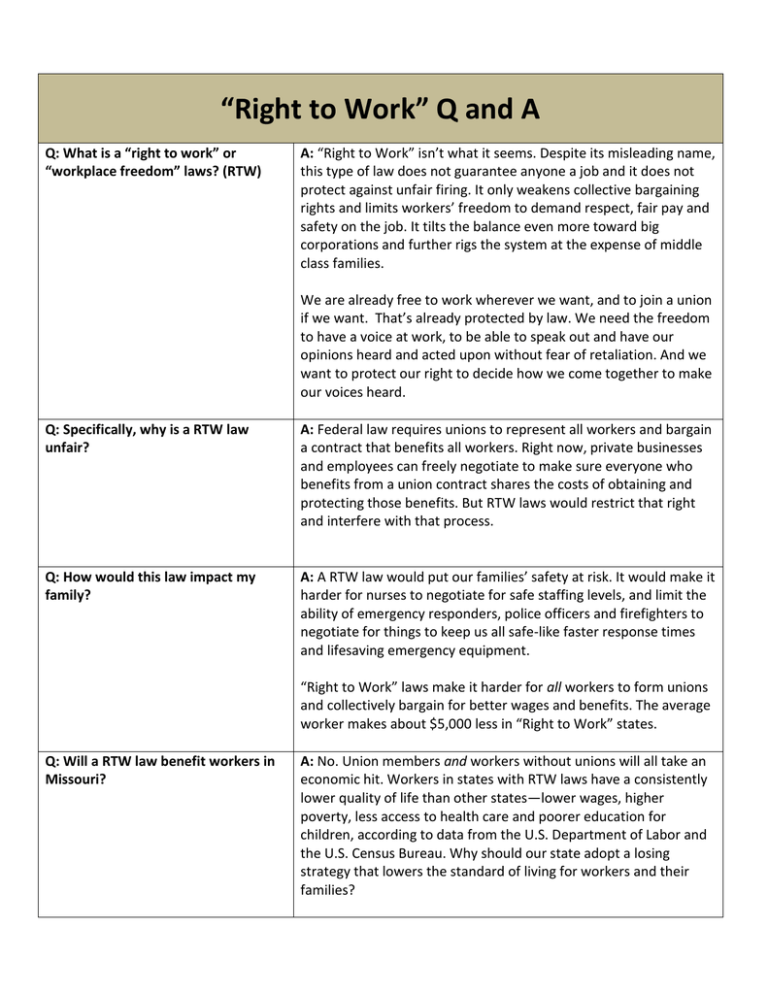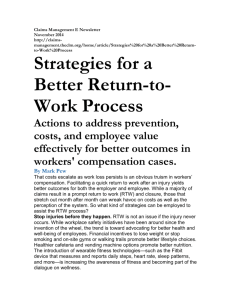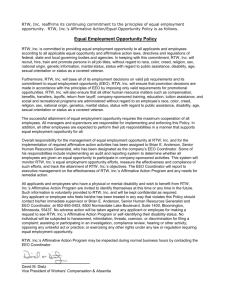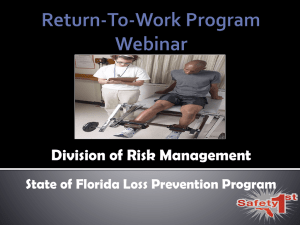MO.RTW.FAQ - Missouri AFL-CIO
advertisement

“Right to Work” Q and A Q: What is a “right to work” or “workplace freedom” laws? (RTW) A: “Right to Work” isn’t what it seems. Despite its misleading name, this type of law does not guarantee anyone a job and it does not protect against unfair firing. It only weakens collective bargaining rights and limits workers’ freedom to demand respect, fair pay and safety on the job. It tilts the balance even more toward big corporations and further rigs the system at the expense of middle class families. We are already free to work wherever we want, and to join a union if we want. That’s already protected by law. We need the freedom to have a voice at work, to be able to speak out and have our opinions heard and acted upon without fear of retaliation. And we want to protect our right to decide how we come together to make our voices heard. Q: Specifically, why is a RTW law unfair? A: Federal law requires unions to represent all workers and bargain a contract that benefits all workers. Right now, private businesses and employees can freely negotiate to make sure everyone who benefits from a union contract shares the costs of obtaining and protecting those benefits. But RTW laws would restrict that right and interfere with that process. Q: How would this law impact my family? A: A RTW law would put our families’ safety at risk. It would make it harder for nurses to negotiate for safe staffing levels, and limit the ability of emergency responders, police officers and firefighters to negotiate for things to keep us all safe-like faster response times and lifesaving emergency equipment. “Right to Work” laws make it harder for all workers to form unions and collectively bargain for better wages and benefits. The average worker makes about $5,000 less in “Right to Work” states. Q: Will a RTW law benefit workers in Missouri? A: No. Union members and workers without unions will all take an economic hit. Workers in states with RTW laws have a consistently lower quality of life than other states—lower wages, higher poverty, less access to health care and poorer education for children, according to data from the U.S. Department of Labor and the U.S. Census Bureau. Why should our state adopt a losing strategy that lowers the standard of living for workers and their families? Q: Isn’t a RTW law important to improving our state’s economy? A: No – we need to bolster our economy, but adopting a RTW law is the wrong priority and would take us in the wrong direction. Our state legislature should focus on strengthening our economy and making sure it works for all Missourians. We need to create more good jobs. We need to stop giving tax dollars to companies that ship work overseas. We need to close unfair corporate tax loopholes and stop employer fraud that deprives workers of rights and allows corporations to cheat on their taxes. But none of that will happen if corporate special interests pass this extreme bill – because it tilts the balance of power even more toward big corporations, at the expense of hard-working, middle class families. Q: Do we need a RTW law to attract new jobs to Missouri? A: No. When Oklahoma adopted a RTW law, supporters claimed it would dramatically improve the state’s job growth. But in fact, according to the Oklahoma Chamber of Commerce’s 2011 report, the number of new companies coming into the state has actually decreased by one-third since RTW passed. Industries locate in a state for many reasons, but RTW laws are not among them. Factors like workforce productivity, availability of skilled workers, transportation, closeness to markets and materials, quality of life and proximity to research universities are the keys to economic growth. A: No one. Some low-wage employers might think they would benefit from weak unions and low wages, but union members are also consumers. RTW laws undermine the purchasing power of unionized workers. “Right to Work” is a power grab by CEOs to make it easier to move us into part-time positions, to off-shore our jobs to low-wage countries, to cut back on our health and safety protections, and to pay us less. A: No: RTW laws are unnecessary – the U.S. Supreme Court ruled long ago that no one can be forced to join a union or to pay fees not directly related to the cost of representing them. A: Yes. Under federal labor law, unions have the duty to fairly represent all workers covered by a contract. But the built-in loophole in this law would allow workers who choose not to join a union to still benefit from all the benefits of union representation without paying anything at all. That’s not fair to their co-workers who play by the rules and pay their fair share. A: “Right to Work” makes it harder for workers to form unions and collectively bargain for better wages and benefits. The average worker makes about $5,000 less in “Right to Work” states. 12 of the 14 states with the worst pay gap between men and women are “Right to Work” states. If we don’t stop these attacks, the middle class will continue to shrink. Q: Who benefits from RTW laws? Q: Without a RTW law, can a worker be forced to join a union or pay dues? Q: Is a union required to represent all employees covered by a contract (nonmembers as well as members)? Q: What’s the impact of RTW laws on wages and benefits?






